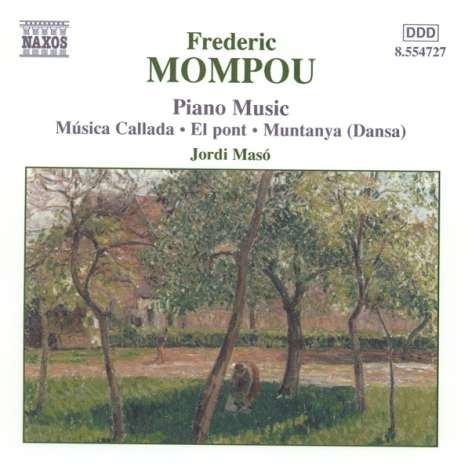Federico Mompou: Klavierwerke Vol.4 auf CD
Klavierwerke Vol.4
Herkömmliche CD, die mit allen CD-Playern und Computerlaufwerken, aber auch mit den meisten SACD- oder Multiplayern abspielbar ist.
(soweit verfügbar beim Lieferanten)
Musica Callada; El pont; Muntanya
- Künstler:
- Jordi Maso, Klavier
- Label:
- Naxos
- Aufnahmejahr ca.:
- 2000
- Artikelnummer:
- 4811547
- UPC/EAN:
- 0636943472729
- Erscheinungstermin:
- 15.4.2002
Der Titel von Mompous Meisterwerk Música callada stammt aus dem Cántico Espiritual des spanischen Mystikers Johannes vom Kreuz, wo der Ausdruck música callada (Musik ohne Klang) durch soledad sonora (Einsamkeit, die schreit) ergänzt wird. Der Dichter erklärt, "dass Musik ohne Klang ist, was die natürlichen Sinne und Fähigkeiten betrifft", aber "die Einsamkeit klingt laut durch spirituelle Fähigkeiten". Trotz der scheinbaren Klarheit der Metapher war ihr Sinn für Mompou "schwierig genug, in einer anderen Sprache als Spanisch zu erklären". Über das allgemeine Verständnis dieser Worte hinaus scheinen sie für den Komponisten eine persönliche Bedeutung zu haben, die nur durch seine Musik zugänglich ist.
Obwohl jedes der 28 Stücke die der musikalischen Sprache Mompous innewohnende Kürze besitzt, stellt das Werk als Ganzes seine ehrgeizigste Leistung dar. Die vier Bände erschienen zwischen 1959 und 1967, dem Zeitraum seiner endgültigen Reife, kurz nachdem er seine emotionale und häusliche Stabilität durch die Heirat mit Carmen Bravo gesichert hatte und während er die Gesellschaft einer intimen Gruppe von Freunden, Montsalvatge, Turull und Valls, genoss, mit denen er in Barcelona die Sorgen dieser Zeit teilen konnte. Sein Ansehen als Komponist, fast als "lebender Klassiker", wurde täglich bestätigt. Seine Música Callada ist eine Zusammenfassung der persönlichsten Elemente seiner musikalischen Sprache, die bis ins Herz der "Geheimnisse der Natur" vordringt, aber dennoch nicht ohne Anklänge an die populäre Musik. Das Werk repräsentiert seine Position als "rückständig" gegenüber der immer stärker hervortretenden Avantgarde. Mompou verzichtet auf die Idee des immerwährenden Fortschritts in der Kunst und behauptet, dass "bei dieser Besteigung schroffer Gipfel manchmal eine Pause notwendig ist". Doch gleichzeitig erreicht seine Musik hier den höchstmöglichen Grad an harmonischer Schwierigkeit und Abstraktion, ohne aufzuhören, seine eigene zu sein.
Product Information
The title of Mompou's masterpiece Música callada comes from the Cántico Espiritual of the Spanish mystic, St John of the Cross, where the expression música callada (music without sound) is complemented by soledad sonora (solitude that clamours). The poet explains 'that music is without sound as far as natural senses and capacities are concerned' but 'solitude sounds out loud through spiritual capacities'. In spite of the apparent clarity of the metaphor, its sense for Mompou was 'difficult enough to explain in a language different from Spanish'. Beyond general understanding of these words, they seem to have a personal significance for the composer, only accessible through his music.
Although each of the 28 pieces has the brevity inherent in Mompou's musical language, as a whole the work represents his most ambitious achievement. The four volumes appeared between 1959 and 1967, the period of his definitive maturity, shortly after he had secured his emotional and domestic stability by marrying Carmen Bravo and while he enjoyed the company of an intimate group of friends, Montsalvatge, Turull, and Valls, with whom he could share the worries of that time in Barcelona. His prestige as a composer, almost as a 'living classic', was daily confirmed. His Música Callada is a summary of the most personal elements of his musical language, penetrating to the heart of the 'mysteries of nature', but yet not without echoes of popular music. The work represents his position as 'backward' in respect of the increasingly prominent avant-garde. Mompou renounces the idea of perpetual progress in Art, claiming that 'in this climbing of rugged peaks it is necessary sometimes to take rest'. Yet at the same time his music here reaches the highest level of harmonic difficulty and abstraction possible without ceasing to be his own.
Disk 1 von 1 (CD)
-
1 Musica callada, Vol. 1: I. Angelico
-
2 Musica callada, Vol. 1: II. Lent
-
3 Musica Callada, Vol. 1: Iii. Placide
-
4 Musica callada, Vol. 1: IV. Afflitto e penoso
-
5 Musica callada, Vol. 1: V. Quarter Note = 54
-
6 Musica callada, Vol. 1: VI. Lento
-
7 Musica Callada, Vol. 1: Vii. Lento
-
8 Musica Callada, Vol. 1: Viii. Semplice
-
9 Musica callada, Vol. 1: IX. Lento
-
10 Musica callada, Vol. 2: X. Lento - cantabile
-
11 Musica callada, Vol. 2: XI. Allegretto
-
12 Musica Callada, Vol. 2: Xii. Lento
-
13 Musica Callada, Vol. 2: Xii. Tranquillo - Très Calme
-
14 Musica Callada, Vol. 2: Xiv. Severo - Sérieux
-
15 Musica callada, Vol. 2: XV. Lento - plaintif
-
16 Musica Callada, Vol. 2: Xvi. Calme
-
17 Musica Callada, Vol. 3: Xvii. Lento
-
18 Musica Callada, Vol. 3: Xviii. Luminoso
-
19 Musica Callada, Vol. 3: Xix. Tranquillo
-
20 Musica callada, Vol. 3: XX. Calme
-
21 Musica Callada, Vol. 3: Xxi. Lento
-
22 Musica Callada, Vol. 4: Xxii. Molto Lento E Tranquillo
-
23 Musica Callada, Vol. 4: Xxiii. Calme, Avec Clartè
-
24 Musica Callada, Vol. 4: Xxiv. Moderato
-
25 Musica Callada, Vol. 4: Xxv. Quarter Note = 100
-
26 Musica Callada, Vol. 4: Xxvi. Lento
-
27 Musica Callada, Vol. 4: Xxvii. Lento Molto
-
28 Musica Callada, Vol. 4: Xxviii. Lento
-
29 El pont
-
30 Muntanya (Dansa)
Mehr von Federico Mompou
-
Federico MompouSämtliche Klavierwerke4 CDsAktueller Preis: EUR 19,99
-
Federico MompouKlavierwerkeCDVorheriger Preis EUR 19,99, reduziert um 0%Aktueller Preis: EUR 18,99
-
Maria Canyigueral - Avant-guarding MompouCDVorheriger Preis EUR 12,99, reduziert um 0%Aktueller Preis: EUR 4,99
-
Judith Jauregui - Pour Le Tombeau De Claude DebussyCDAktueller Preis: EUR 19,99






